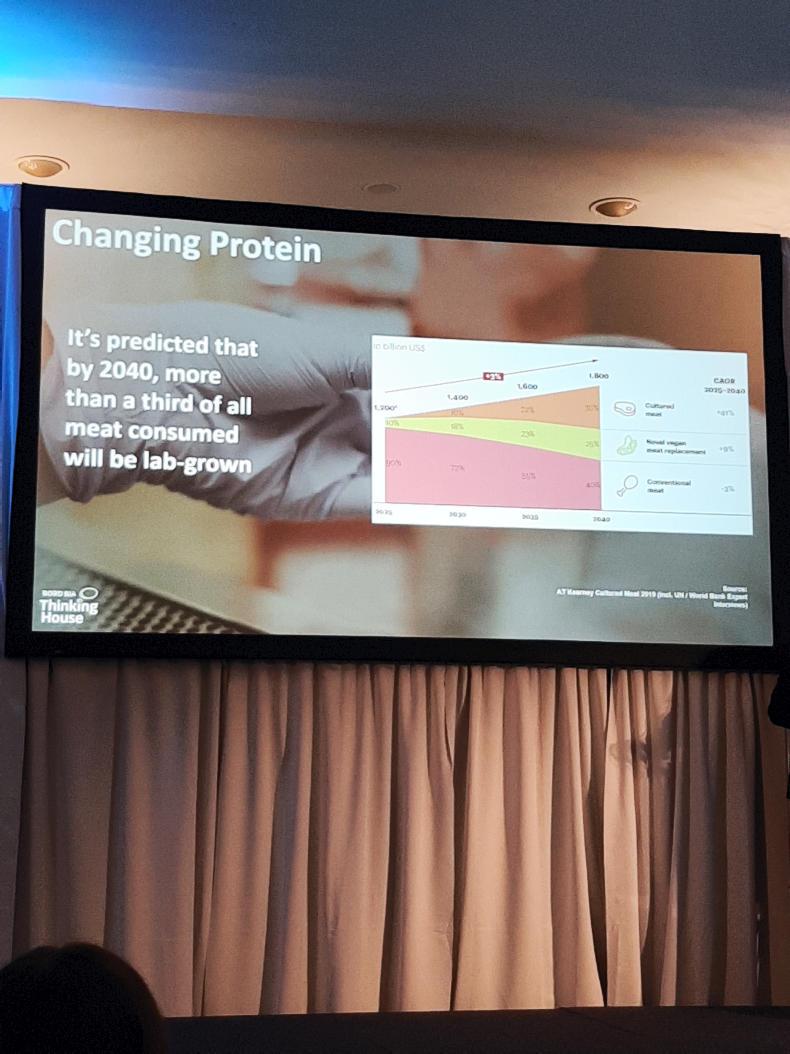The volume of lab-grown meat is expected to increase majorly over the next 20 years. Speaking at Friday’s Bord Bia Meat Market Seminar, Rory McDonnell from Bord Bia’s Thinking House presented data which forecasts that by 2040, one-third of all meat consumed could be lab-grown.
If this prediction was to materialise, traditional meat sales are predicted to then reduce 3% by 2040, while there is also forecast growth in novel vegan meat replacement such as plant-based substitutes. By 2040, the breakdown in meat or meat substitute sales is forecast to be split into a three-way ratio of 40% conventional meat, 35% lab-grown meat and 25% meat replacements.
It should be pointed out that this is a forecast with Rory underlining that the major benefit is a significant global increase in demand for protein, stemming primarily from the global population forecast to increase from 7.6bn to 9bn over the next 15 years.
Consumer trends
Rory said that while consumer trends may be changing, consumers are still very much focused on protein intake. He said that over one-fifth of adults worldwide are actively trying to increase their intake of protein, with a 17% increase forecast between 2013 and 2023. Growth in demand is expected in all major population markets such as China, the Middle East, US and India.
He also highlighted the rise of mega cities, which are defined as a city with a population of over 10m. There were 10 cities classified as a mega city in 1990. This currently stands at 33m and is expected to increase to 50 cities by 2030. The number of middle class consumers is also growing and is expected to increase to 3.5bn over the next 15 years.
Positive story to tell
These consumers all have a greater demand for protein but they are becoming more mindful about what they eat. Data was presented from a US survey which showed that 67% of people feel that climate change poses a direct risk to their existence. Some 44% of European adults aged between 18 and 35 consider meat consumption to be harmful for the environment.
Unfortunately, agriculture and in particular conventional meat production is currently under fire in this respect, with a growing concern for the environment shifting people’s perception of meat.
The fact that the last five-year period has been the warmest since records began along with recent weather extremes and wildfires in Australia is shining a spotlight on climate change.
Conventional meat can capitalise on this growth and has a positive story to tell
Rory feels, however, that conventional meat can capitalise on this growth and has a positive story to tell. The sector must act quickly to position itself as producing a premium product built on strong environmental credentials.
In her opening address Tara McCarthy, CEO of Bord Bia, urged the meat industry to work together. She said that if companies are fractured and work independently then it will be impossible to secure a premium in export markets with meat sales trading in a commodity market.
She concluded by saying that if the meat sector really wants to make progress then it needs to unite and meet consumer needs.
Read further analysis in next weeks’ Irish Farmers Journal and on www.farmersjournal.ie.











SHARING OPTIONS